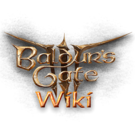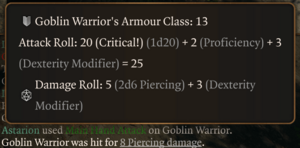More actions
An Attack Roll happens when the game wants to decide whether an attack will hit its target. The Attack Roll uses a D20 and can be affected by Modifiers such as the Ability Score Modifier and Proficiency Bonus of the creature making the attack.
The result of the roll is compared to the Armour Class of the target. If the Armour Class is reached or exceeded, the attack is a successful hit, and the game proceeds with a Damage Roll to determine the amount of damage dealt.
Attacks done with Weapons always use an Attack Roll to determine success. Some spells also use an Attack Roll to determine whether they hit their intended target (such as Fire Bolt or Eldritch Blast), though other spells hit the target automatically (such as Magic Missile or Fireball). A spell that hits its target automatically may allow the target to make a Saving Throw instead.
Critical Miss / Critical Hit
As a special case, a roll of 1 means that the attack fails to connect, regardless of bonuses or the target's Armour Class. This is called a Critical Miss.
Likewise, a roll of 20 means the attack succeeds regardless of the target's Armour Class. This is called a Critical Hit. A critical hit rolls all the damage dice of the attack twice, including damage dice from other sources such as sneak attacks, poison, and Paladin smites.
Modifiers
Attack Rolls can be affected by ![]() Advantage/
Advantage/![]() Disadvantage, by the attacker's Ability Score Modifier, the attacker's Proficiency Bonus, Weapon Enchantments, Bless, High Ground/Low Ground, Bane, Loviatar's Blessing, Magic Weapon, Sacred Weapon, and Archery Fighting Style.
Disadvantage, by the attacker's Ability Score Modifier, the attacker's Proficiency Bonus, Weapon Enchantments, Bless, High Ground/Low Ground, Bane, Loviatar's Blessing, Magic Weapon, Sacred Weapon, and Archery Fighting Style.
Ability Score Modifier
A bonus or penalty may be applied to the result of the roll based on an Ability Score. Which ability is used depends on the type of attack being made.
Weapons
Melee and ranged weapon attacks use Strength or Dexterity, depending on the weapon: usually Strength for melee weapons and Dexterity for ranged weapons. The exceptions to this rule are Finesse weapons, which automatically select Strength or Dexterity, whichever score is higher; and Thrown weapons, which use Strength for both melee and ranged attacks. If a weapon is both Thrown and Finesse, it uses the higher of Strength and Dexterity for both melee and ranged attacks.
Some examples, to make the possible combinations of Finesse and Thrown easier to understand:
- Using a Maul for a melee attack always uses Strength.
- Using a Rapier (Finesse) for a melee attack uses Strength or Dexterity; whichever the attacking creature has a higher score in.
- Shooting a Longbow for a ranged attack always uses Dexterity.
- Throwing a Handaxe (Thrown) for a ranged attack uses Strength.
- Throwing a Dagger (Finesse & Thrown) for a ranged attack uses Strength or Dexterity, whichever is higher.
Spells
For spells, the Ability Score used for the Modifier depends on the class of the caster:
|
|
|
|
In Baldur's Gate 3, the same ability modifiers apply when casting a spell from a Scroll, even when the spell being cast is not normally available to your class. For instance, a Sorcerer casting ![]() Guiding Bolt (a Cleric-only spell) from a scroll adds its Charisma modifier to the Attack Roll of the spell.
Guiding Bolt (a Cleric-only spell) from a scroll adds its Charisma modifier to the Attack Roll of the spell.
Value of the Modifier
Whichever Ability Score ends up being used, the bonus or penalty value is based on this table, depending on how high the used Ability Score is:
| Ability score | Modifier value | Ability score | Modifier value | |
|---|---|---|---|---|
| 1 | -5 | 16-17 | +3 | |
| 2-3 | -4 | 18-19 | +4 | |
| 4-5 | -3 | 20-21 | +5 | |
| 6-7 | -2 | 22-23 | +6 | |
| 8-9 | -1 | 24-25 | +7 | |
| 10-11 | +0 | 26-27 | +8 | |
| 12-13 | +1 | 28-29 | +9 | |
| 14-15 | +2 | 30 | +10 |
Proficiency Bonus
The attacking creature's Proficiency Bonus is added to the result of the roll if the creature has the correct kind of Proficiency for the attack it's making.
For weapon attacks, the creature must have proficiency in the weapon it's using to make the attack.
For spell attacks, the creature must have innate spell casting capabilities granted by its Class, Subclass, or Feats. As a notable exception, despite not being able to cast spells normally, Barbarians receive their Proficiency Bonus when casting spells from Scrolls (as of Early Access Patch 9).
The value of the bonus depends on the attacking creature's Level:
| Level | Proficiency Bonus |
|---|---|
| 1 to 4 | + 2 |
| 5 to 8 | + 3 |
| 9 to 12 | + 4 |

